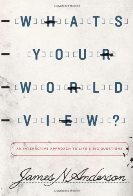The rise of pluralism in our day has of course spelled the end of the (more or less) common worldview that was shared within “Christendom,” and so it has become increasingly important for us to examine our most fundamental beliefs and to articulate them clearly to the world we hope to influence with the gospel.
The last generation has seen a large number of books examining and evaluating various worldviews, but in James Anderson’s What’s Your Worldview? An Interactive Approach to Life’s Big Questions we have the first “interactive” book that actually leads you to understand and identify the worldview you already hold (whether you were aware of it or not!) and to see something of its implications.
You might think that such a book was written exclusively for academics and not for popular audiences, but that most definitely is not the case. What’s Your Worldview? is easily – even enjoyably and engagingly – accessible to any Christian reader, even those who are not accustomed to grappling with what are sometimes very weighty issues.
And so this book is a uniquely helpful introduction to a very important topic, and the author – Dr. James N. Anderson, Associate Professor for Theology and Philosophy at Reformed Theological Seminary in Charlotte – is here to talk to us about his work.
Books At a Glance (Fred Zaspel):
First, for those who may be new to the discussion, what is a worldview? And why is it important for us to know about it?
Anderson:
As the word itself suggests, a ‘worldview’ is an overall view of the world. It isn’t a physical view, but rather a philosophical view of the universe as a whole and our place within it. A worldview is an all-encompassing perspective on everything that exists and matters to us. A person’s worldview represents their most fundamental beliefs, assumptions, and ideas, and their deepest values. It reflects how that person would answer (or would be inclined to answer) all the big questions of human existence.
Everyone has a worldview, whether they realize it or not. And more than anything else, our worldviews affect how we think about the world and what takes place in it, how we evaluate our experiences, how we react to events, how we relate to other people, and how we live our lives on an everyday basis. For this reason, it’s important to recognize that each of us has a worldview, to reflect on what that worldview involves and implies, and to think critically about whether it can actually makes sense of the world – indeed, whether it is actually true.
 Books At a Glance:
Books At a Glance:
What are the leading elements of a distinctly Christian worldview?
Anderson:
It’s very difficult, if not impossible, to do justice to all the distinctive elements of a Christian worldview in a paragraph or two! In brief, I understand the Christian worldview to be that worldview implied, and to a large extent assumed, by the teachings of the Bible.
The leading elements of that worldview would include: a distinctive understanding of God as the sovereign Lord who created all things, sustains and directs all things, and who exists eternally as Father, Son, and Holy Spirit; a view of mankind as created in the image of God, with the purpose of glorifying God and delighting in him; a recognition of the fallenness and corruption of the cosmos due to human sin; and a glorious vision of the redemption of God’s people and the renewal of the creation through the incarnation, atonement, and resurrection of the Son of God, Jesus Christ. Of course, so much more could be said; but these are some of the central elements of the biblical worldview.
Books At a Glance:
Given the rise of pluralism, is there a worldview that tends to dominate in the thinking of our society? How might you characterize today’s mind generally? Or is this question impossible to answer?
Anderson:
In centuries past, the dominant worldview in Western societies was a basically Christian one, but that’s certainly no longer the case. Worse still, many professing Christians don’t actually hold to a biblical worldview. I don’t think there’s one dominant worldview in our culture today. Instead, we see multiple worldviews in conflict with one another: Christianity is one, Naturalism (or Materialism) is another, and Pluralism is yet another. Pantheism and Panentheism have also made inroads due to the rise of so-called “New Age” spirituality, which is really just Eastern religion repackaged for Western consumption.
Books At a Glance:
Do you find evidence that the advance of pluralism in our society has significantly affected the worldview of many Christians?
Anderson:
Yes, I think so. According to a 2008 Pew Forum survey, 78% of Americans identify as Christians, but 65% of Americans agree that “many religions can lead to eternal life,” and 47% of white Evangelicals agree with that same statement. We could quibble about the definition of ‘Evangelical’ used by the pollsters, but even allowing for a broad definition, that’s a shocking statistic. My take on it is not that Christians are embracing pluralism so much as they’re being intimidated by it, such that they lack confidence in – or are just embarrassed by – the exclusive claims of Christ and Scripture.
 Books At a Glance:
Books At a Glance:
What do you hope to accomplish in your book? What contribution are you hoping to make?
Anderson:
My goals for the book are relatively modest. I want to help the reader to understand (1) what a worldview is; (2) why worldviews matter; (3) what their basic worldview is; (4) how their worldview differs from other worldviews; and (5) why some worldviews make more sense of the world and our experiences than other worldviews. But the book also functions as an implicit apologetic for the Christian worldview. I’m convinced that the Christian worldview is the most intellectually and existentially satisfying worldview, and that conviction is reflected in the commentary I give and questions I ask throughout the book.
There are countless books on apologetics and plenty of books on worldviews, but there are relatively few books on apologetics – especially applied apologetics – that take an explicitly worldview-based approach, engaging with people at the level of their overarching worldview and their ultimate presuppositions about truth, knowledge, goodness, God, and so on.
Books At a Glance:
Explain for us what is unique about your approach and how it is to be read. How is your book like a “Choose Your Own Adventure” books? And what do you hope are the advantages of this approach?
Anderson:
Certainly the most distinctive feature of What’s Your Worldview? is its interactive, non-linear format. You aren’t meant to read it from front to back, like a regular book. (If you try that you’ll be very confused!) Instead, you’re presented with a series of yes/no questions (e.g., “Is there any objective truth?”) with a one-page explanation of each question to clarify exactly what the question is asking. Depending on your answer to the question, you’re directed to the next question page in the sequence or to an “end of the trail” page where a particular worldview is identified and summarized, although with some commentary and questions designed to provoke further reflection.
My hope is that readers will find this format interesting and engaging – particularly in an internet age where (for better or worse!) people have become more accustomed to interactive, non-linear modes of reading. I think the format makes the book particularly appealing to the younger generations, but anyone who enjoyed those “Choose Your Own Adventure” books should find it a fun read!
Books At a Glance:
What audience did you have in mind when writing this book? What are some contexts (besides individual reading) in which you think it could be most useful?
Anderson:
I had a wide audience in mind when writing the book. It certainly isn’t aimed only at Christians, although I hope that fellow believers will find it a helpful resource. When writing it I had a number of non-Christian friends and acquaintances in mind; the idea all along was to write a book that I could put in the hand of an unbeliever and say, “Read this and let me know what you make of it!” In other words, it’s designed to be tool for initiating fruitful conversations about ultimate issues. As I noted earlier, the format may be more suited for younger folk, but I’ve had people of all ages tell me they enjoyed reading it and found it instructive.
I think the book can be useful in a number of contexts, but particularly in evangelism and discipleship. I know of people who are using it as the basis for Sunday school classes, for youth retreats, and for church study groups.
Books At a Glance:
How can your book help us learn to share the gospel more effectively … or create opportunities for sharing the gospel with our friends?
Anderson:
I’m pretty old-school when it comes to evangelism! There’s no substitute for simply proclaiming (and living out) the gospel message, all in the context of the preached word of God. However, the reality is that in our post-Christian culture many unbelievers think they’ve heard it all before and they don’t see Christianity as a “live option.” Christian evangelism is commonly caricatured and dismissed. So I hope this book can serve as a creative tool to open a door for the gospel: to challenge the unbeliever’s assumptions and “put a pebble in his shoe” so that gospel can get a serious hearing. The book makes clear that Christianity isn’t simply a collection of old stories or a lifestyle choice, but rather an all-encompassing worldview that transforms a person’s entire outlook on the world. And since the gospel is at the center of the Christian worldview, by getting readers to consider the Christian worldview in comparison to other worldviews the book is thereby inviting readers to consider the gospel itself.

